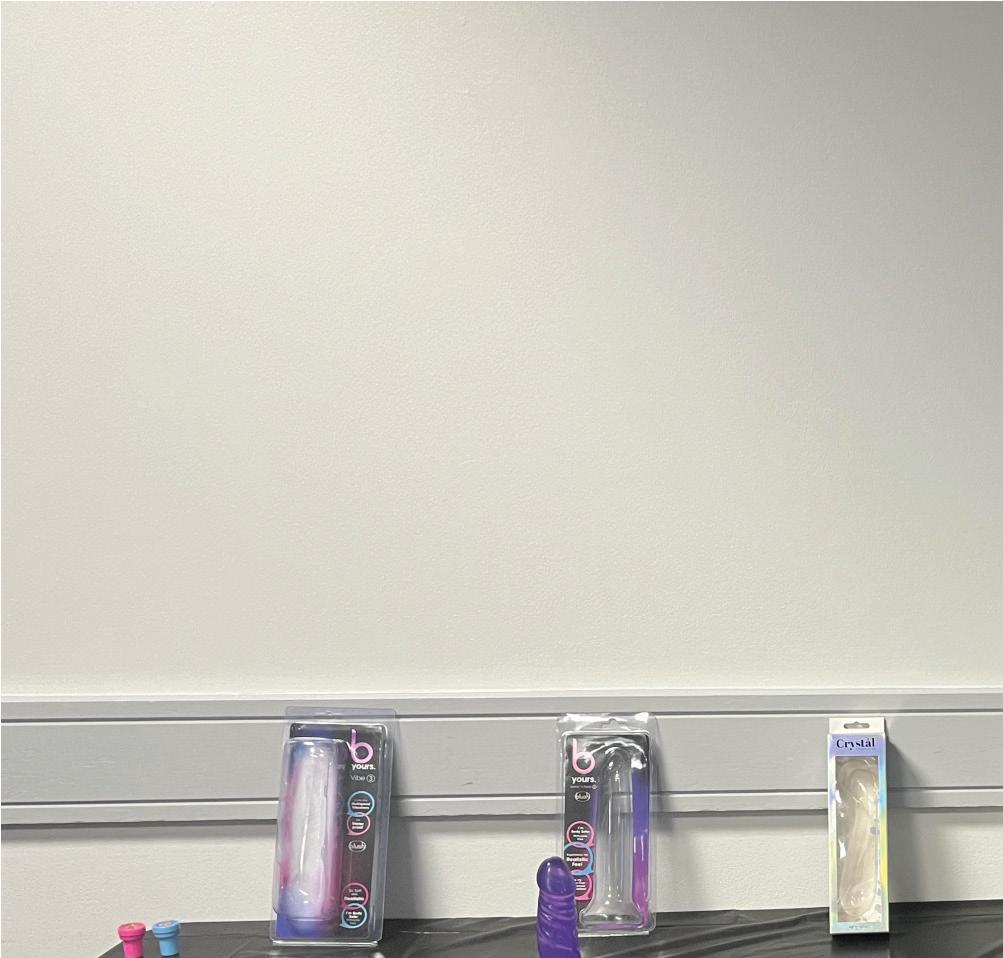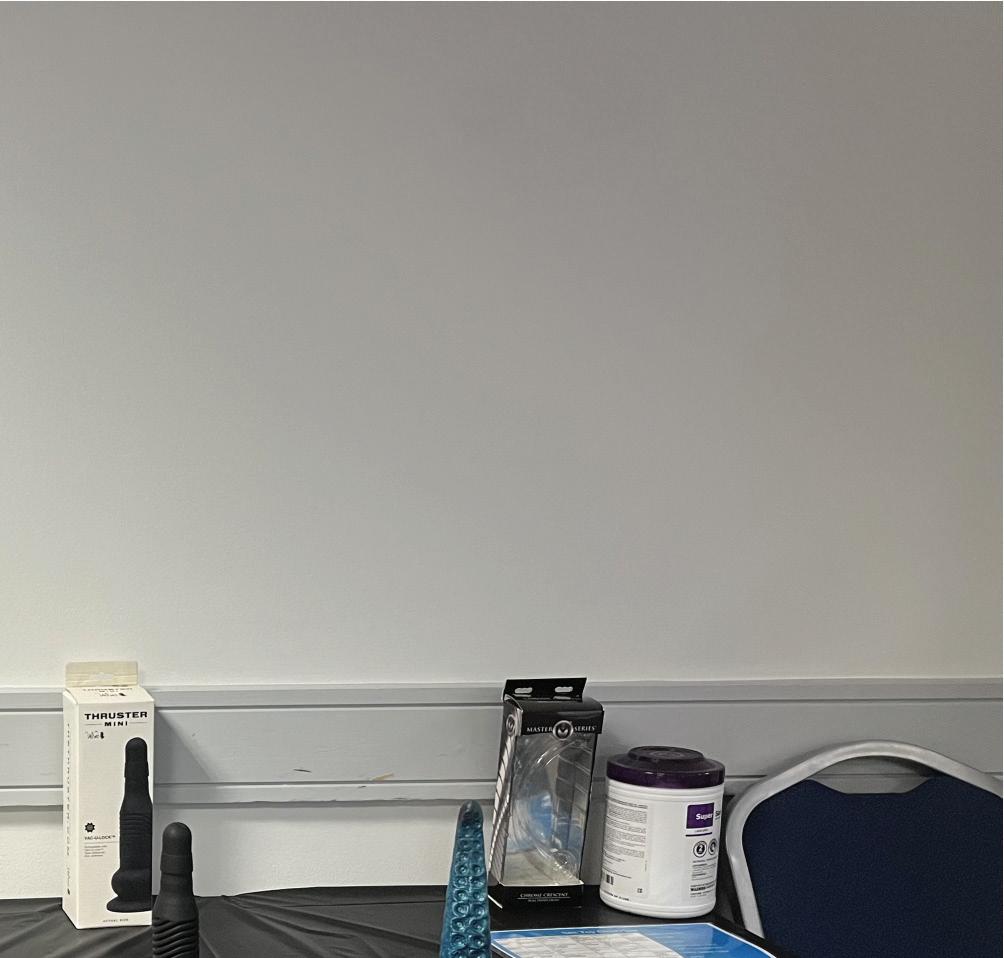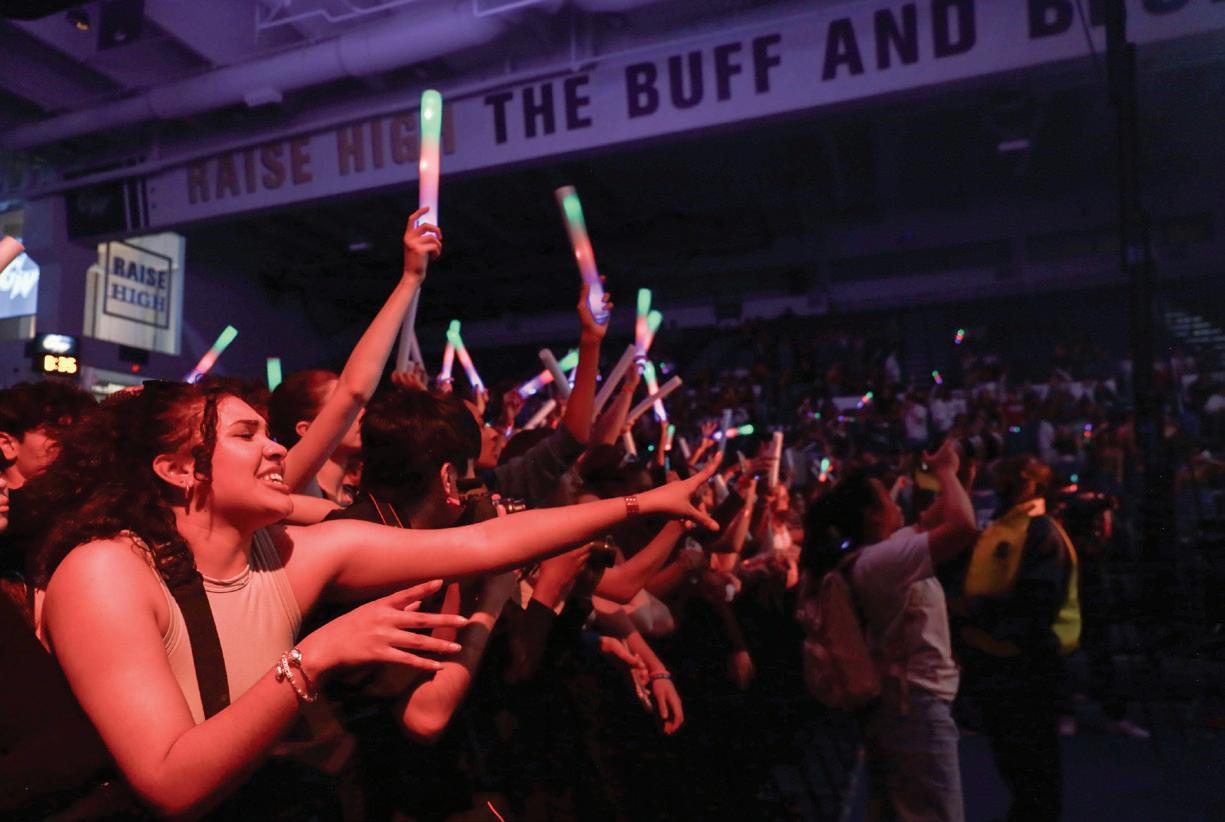ANC elects new chair, opposes Triangle Park encampment clearing
Members of a local governing body elected a new chair during a meeting Wednesday.
The Foggy Bottom and West End Advisory Neighborhood Commission elected then-vice chair and 2A03 Commissioner Trupti Patel to serve as chair, replacing Commissioner Jim Malec who is resigning from the ANC on May 1. Four out of five present commissioners voted to approve Patel as chair and 2A04 Commissioner Ed Comer abstained.
Members unanimously voted to elect 2A05 Commissioner Luke Chadwick to replace Patel as vice chair. Here are some of the meeting’s highlights:
ANC denounces Triangle Park encampment clearing
Commissioners approved a resolution opposing the clearing of a homeless encampment in Triangle Park along Virginia Avenue between 20th and 21st streets, which is scheduled for May 15. The resolution states that the clearing would displace about 40 unhoused individuals.
2A01 Commissioner Yannik Omictin, who introduced the resolution, said it requests that officials from D.C.’s Department of Human Services and the Office of the Deputy Mayor for Health and Human Services meet with commissioners before May 15 to discuss why officials are clearing the encampment. Omictin said the clearing is not a “sustainable solution” because it would force the unhoused individuals to relocate to a different park.
Ward 2 Councilmember Brooke Pinto told commissioners at the ANC’s March meeting that unhoused residents at Triangle Park were “not willing” to work with DMHHS officials to move into housing. Pinto said Tri-
angle Park falls on District and National Park Service land, making it more difficult for District officials to determine different agencies’ jurisdiction when conducting outreach to the encampment. Omictin said preventing the clearing is going to be “tough” because NPS is a federal agency and doesn’t have an obligation to listen to the ANC, but that he is in contact with NPS officials to request they meet with commissioners.
Commissioners elect bylaw revision committee members
Commissioners elected Marina Streznewski and former ANC Chair Florence Harmon to serve on the ANC’s Bylaws Revision Special Committee alongside the commission, kicking off the bylaw revision process. The ANC created the committee at its February meeting to ensure the body’s bylaws are compliant with the D.C. Code. Commissioners used a ranked-choice voting system to select from four nominees.
Officials to consider implementing drugfree zone near 26th Street
Metropolitan Police Department Lieutenant Michael Howden said officials are working on making the park west of 26th Street and south of K Street a drug-free zone. Drug-free zones allow MPD officers to disperse groups of people congregating in the zone to prevent illegal drug activity, as authorized by the Secure DC Omnibus Emergency Amendment Act of 2024.
Two members of the public gave comment opposing the implementation of the drug-free zone. D.C. residents have expressed concern drug-free zones will allow for overly confrontational policing.
Commissioners support construction projects
Commissioners unani-
mously approved a resolution supporting the renovation of the playground and dog park at 26th and I streets. The Department of Parks and Recreation will work with contracting partner WKM Construction and landscape architect and engineer VIKA Engineering.
Peter Nohrden, a landscape architect with DPR, said the project’s $1 million budget will go toward upgrading the existing playground and dog park, preserving and adding trees and improving ADA access to the park.
He said the project will switch the current locations of the dog park and playground, moving the playground into the more visible area.
The ANC also approved the construction of a penthouse and an ADA bathroom at the office complex at 1750 H Street.
Commissioners support funding for School Without Walls, Aston roof repair
Commissioners voted 5-0-1 to support a resolution urging the D.C. Council and Chairman Phil Mendelson to match last year’s $235,000 allocation to the School Without Walls in the fiscal year 2025 budget. The resolution states that under the current budget, the school would likely need to lay off the heads of the Chinese and theater departments. The resolution comes after students started an online petition last month calling for additional funding to preserve the school’s theater program as well as students’ testimony in support of the petition at a Deputy Mayor of Education hearing earlier this month. The ANC unanimously approved two resolutions requesting that The Aston, a former GW residence hall, secure funding from the city to repair the building’s roof in 2025 instead of 2028 as the Department of General Services expected.
NEWS THE GW HATCHET April 22, 2024 • Page 2
HARIMAN REPORTER PHOTO ILLUSTRATION BY JERRY LAI | PHOTOGRAPHER Pages of amicus briefs in Idaho v. United States, which the Supreme Court will hear Wednesday
MICHAEL
ERIKA
RORY QUEALY ASSISTANT NEWS EDITOR
FILTER NEWS EDITOR
HATCHET FILE PHOTO The Tempietto basks in the sun in Kogan Plaza. News THIS WEEK’S EVENTS TRADE & DEVELOPMENT SEMINAR WITH MARCO GONZALEZ-NAVARRO Monday, April 22 | 12:30 p.m. | Hall of Government Attend a seminar on trade and development with UC Berkeley Associate Professor Marco Gonzalez-Navarro. THE ENDURING FOG OF WAR: A.I. AND THE FUTURE OF HUMANS IN NATIONAL SECURITY Wednesday, April 24 | Noon | Phillips Hall Join the CCAS history department for a discussion on artifical intelligence among experts on national security. An ex-American Nazi Party member sued GW for $50,000 after he was pelted with eggs and attacked with stink bombs while attempting to deliver a speech on campus. THIS WEEK IN HISTORY April 24, 1972
HAILEY PRUNIER REPORTER

Men’s basketball adds William & Mary transfer guard
William & Mary transfer sophomore guard Trey Moss announced his commitment to GW on Thursday, according to his X, formerly known as Twitter.
The former Tribe guard averaged 13.5 points per game this past season, paired with 2.2 assists per game and 2.2 rebounds per game in his lone season at William & Mary. Moss’ transfer to GW marks his third school after the Orlando, Florida, native started his collegiate career at the University of South Florida in 2021.
Moss’ commitment marks the third addition to Head Coach Chris Caputo’s roster for the 2024-25 season. He joins Cornell senior forward Cole Hansen and Providence redshirt sophomore forward Rafael Castro who both committed last week. Moss will look to fill the role of departing guard Maximus Edwards as well as the ability to be a ball carrier.
The Tribe finished 4-14 in Coastal Athletic Association play, concluding a 10-23 season overall in the 2023-24 season.
The 6’3” guard started 32 of the Tribe’s 33 games this past season and finished 13th in the CAA in minutes played with a total of 1,033 minutes. Moss finished 16th in the CAA in scoring, totaling 446 points on the season.
Moss had his best offensive game against Drexel on Jan. 6, when he tallied 22 points on 1018 from the field in the Tribe’s 77-55 loss to the Dragons.
Moss recorded 11 points and four rebounds, shooting four-18 from the field in the Revs’ defeat of William & Mary in November with a score of 95-89.
In his freshman season, Moss appeared in all of the Bulls’ 31 games, one of three players to do so that season. He averaged 1.2 points per game along with 1.0 assists and 1.0 rebounds. In his sophomore season at USF, Moss redshirted after eight games before transferring to William & Mary for the 2023-24 season.


Golf finishes sixth place at North Carolina tournament
Golf finished in sixth place last week at the Wofford Intercollegiate in Hickory, North Carolina, marking the end of their regular season.
The Revs kicked off with a 292 in the opening round Monday, followed later that day by a 290, and culminated with a 286 in Tuesday’s final 18 holes. They finished 292290-286 (868, +28) overall, 22 strokes behind the tournament champions, South Carolina.
Sophomore Jed Dy and fifth-year Jakub Hrinda secured an 18thplace tie with a 7-over 217. Dy showcased consistency with rounds of 72, 72 and 73, while Hrinda staged a comeback from a challenging second round, delivering a 68 on Tuesday, punctuated by five birdies.
Earlier this month, Hrinda announced his plans to play professionally after graduation. Hrinda will compete in the European Qualifying School’s four-round event this

September to earn a spot on a European one-year tour. Not far behind, sophomore Rodrigo Barahona finished just a shot behind his teammates, securing a tie for 21st place with an 8-over 218. Meanwhile, graduate student Hugo Riboud gave the Revs their first under-par round, finishing with a 1-under 69 in the second round Monday.
The Revs posted their lowest score of the spring season just before the Wofford tournament.
At the Irish Creek Collegiate hosted by Appalachian State, GW scratched an 11-over 858 on April 9, a fifth-place tie.
Up next, the Revs are gearing up for the Atlantic 10 Championship on April 26 in Orlando, Florida.
GW finished fourth in
the tournament the past two seasons. In 2023, Hrinda tied for sixth place (1-over 217) in individual scoring, and Barahona and Dy also carded top-20 finishes. In 2019, GW’s Logan Lowe claimed the individual championship.
GW last won the A-10 Championship in 2012, when the sixth-seeded team broke a 36-hole program record to finish with 568, 7-under par.
Swimmers applaud reversal of Smith Center pool renovation plans
From Page 1
Prior to the reversal of the plans, members of the team expressed concern that the University did not give the team proper warning of the change and was not providing adequate practice alternatives.
Bernosky said when Vogel first informed the team of these plans in September, her teammates were upset and confused.
“People were immediately reacting,” a swimmer who wished to remain anonymous said. “We had people crying, people who were upset, a lot of questions being asked.”
Members of the team said they were not given potential practice schedules until midMarch, which, once shared with them, made class registration difficult due to time constraints. This, combined with foreseen issues traveling outside of campus to practice, prompted several swimmers to enter the transfer portal.
Multiple members of the swim and dive team have said that more than 10 swimmers had entered the transfer portal. Uncertainty regarding whether members on the team will transfer has created upheaval
Student engineers race vehicle during Red Bull Showrun
The University’s Baja Society of Automotive Engineers team drove their handmade competition vehicle during Saturday’s Red Bull Showrun, a Formula One event taking over Pennsylvania Avenue. The team, which is predominantly female led this year, builds a vehicle each year in the University’s School of Engineering & Applied Science building, to compete in various competitions separated by dynamic events, which test the vehicle’s drive, and static events, which test the vehicle’s design, against other universities. Team members said Showrun planners invited Society of Automotive Engineers groups from the East Coast to drive their vehicles down a stretch of Pennsylvania Avenue with tens of thousands of onlookers watching the event and give a brief statement about their team.
Metropolitan Police Department officers blocked off Pennsylvania Avenue between 3rd and 7th streets Northwest to provide a space for fan zones for viewing and
races. Coulthard drove the RB7 car while also performing donuts on the road. This year’s 15-person team is composed of several engineering subteams made up of three to four people who are individually responsible for designing, manufacturing and installing various parts of the vehicle.
“I’m really happy with how this year’s car is performing in test drives this year,” team captain and junior Anjali Vu said in a message. “We have a few powertrain inefficiencies to sort out, but our steering, 4WD system and reliability are all even better than we expected. We also are using a new engine for the first time in over a decade, so a lot of the car has been redesigned to integrate the higher horsepower.”
The team earned 64th place in the Baja SAE Rochester competition out of 88 teams and wrapped up their season clinching 27th place at Baja SAE Arizona out of 45 teams in 2022.
Vu said she and other members are responsible for manufacturing parts and building the vehicle themselves.
“I think for other women in engineering, especially seeing two female captains, and we’re doing the welding on the car, we’re doing the manufacturing
amongst the team, they said.
“It’s not that people are in the portal because they want to have to leave,” freshman swimmer Zoe Schneider said.
“So there’s been this weird culture, almost shock of people who are leaving obviously don’t like what’s happening and want to talk about it and express their feelings. But it’s difficult when you’re in a team setting, you’re still practicing together, you’re still in the locker room together.”
Even after the reversal of the decision, some swimmers in the portal say they are uncertain about returning, as entering the portal and returning allows for scholarship money to be reduced.
The email also said that the University will search for solutions regarding a practice facility for the basketball programs.
Fans of GW’s basketball programs expressed disappointment at the reversal of the decision, with some saying that it puts GW’s teams at a disadvantage compared to A-10 rivals.
“It is laughable for us not to have one of these yet while pretty much everyone else in the league does,” said former George’s Army co-president Ryan Puleo on X.

in the student shop and making sure we go far,” Vu said. “It’s really important to come in with that confidence and be like, ‘Yes, I do know what I’m doing.’”
Principal engineer and junior Shelby Pullen said she
aims to create a safe space for women within the team so underrepresented groups can enjoy engineering, which is male-dominated. “I think it’s really important for me to create the space for women engineers, specifically
at GW because the gender ratio is so skewed compared to other schools,” Pullen said. “This is such a great opportunity for women to get involved in motorsports and mechanical engineering that just doesn’t exist in other places.”
Sports NUMBER CRUNCH
29.1 GAMES OF THE WEEK SPORTS THE GW HATCHET April 22, 2024 • Page 7
The 3-point shooting percentage of new GW guard Trey Moss, who transferred from William & Mary.
HATCHET FILE PHOTO A GW golfer tees off at a practice in 2018. WOMEN’S TRACK AND CROSS COUNTRY Penn Relays Thursday Women’s track and cross country will race in the Penn Relays on Thursday. BASEBALL at Georgetown Wednesday | 6:30 p.m. The Revs will travel to face off against their crosstown rivals Wednesday night.
MARGOT DIAMOND, STAFF WRITER
RYAN JAINCHILL STAFF WRITER
MAYA NAIR | STAFF PHOTOGRAPHER
New transfer to GW and sophomore guard Trey Moss defends Max Edwards near the paint.
a track.
Showrun featured Formula
David Coulthard who won 13 Formula
The Red Bull
One driver
One Grand Prixes
KRISTI WIDJAJA STAFF WRITER
GABRIELA PASSOS | PHOTOGRAPHER
A GW Baja driver celebrates in the team’s car.
Inside the Newman Center’s homey space, fraternity neighbors
DIANA ANOS STAFF WRITER
Sandwiched between fraternity houses across from the Smith Center stands a bright blue townhouse — the hub of the Catholic student presence on campus. The Newman Center acts as the home base for Catholic student organizations like GW Catholics and Friends of Knights of Columbus, an organization focused on hosting prayer services and events for male Catholic students on campus. As fraternity events rage next door, the center gathers students in its chapel for a nightly Mass, offered on weeknights at 6:10 p.m. and confession, offered on weeknights from 5:30 to 6 p.m.
Rae Grabowski, the Newman Center’s campus minister, said the center helps students stay connected with their Catholicism as they juggle other college responsibilities and build relationships with other students by providing a place to hang out during the day.
After walking up the iron stairs and entering the tall blue door of the Newman Center, a narrow and steep staircase leads visitors to office spaces for the campus minister. The main level features a library that students use to do homework and spend time together and translucent doors that open up to the chapel.
The narrow room of the chapel feels small, but Grabowski said it can hold about 50 people. She said the chapel tends to be about half full for the center’s Tuesday services, with 15 to 25 students attending Mass. The area is reminiscent of what one imagines a traditional Catholic church to look like, despite its location in a Foggy Bottom townhouse: pews with kneelers, books in the pockets of the benches, an altar and glass windows. In contrast to the reverent space, just back down the stairs, the basement features a kitchen and lounge where students can unwind and cook together. Grabowski said the center offers confessions with the Newman Center Chaplain Stefan Megyery, either face to face or in a confessional, a booth that divides the priest from students during the sacrament. She said Tuesday night Masses are often the most popular events of the week since they feature a dinner afterward where students can relax and eat together in the basement.
Grabowski said the center is often used as a space to socialize and relax, but sometimes students have “caught themselves” being a bit too social — almost letting curse words slip in the townhouse with her around.
Grabowski said the center also offers religious retreats and talks on Catholic
social teaching from center staff and guests including George Weigel, a Pope John Paul II biographer. She said students consider the center a home where they can “spend some time with Jesus” and escape a bad day.
Grabowski said interactions with the center’s fraternity neighbors can be “interesting.” She said when the weather gets nicer and fraternity members spend time in the backyard, students can hear the fraternities’ daytime parties from the chapel. Grabowski said the Newman Center has adjusted the scheduling of its weekly board meetings to accommodate members of GW Catholics involved in Greek life on campus who often have fraternity or sorority events at the same time.
Megan Clancy, the student president of GW Catholics, said she goes to the Newman Center every day and has met some of her “closest friends” there.
Clancy said she thinks the center’s smaller chapel is a cozy and special space for her to pray. She said while the Newman Center chapel is smaller than a typical chapel, it’s “different in a good way.”
“The fact that I can go to Mass on campus is just really, really wonderful,” said Clancy. “It’s the high point of my day, it’s what I look forward to. So the fact that we’re able to offer that to people is super important.”




As students filed into the University Student Center for the inaugural Sexsonian Exhibit on Thursday, they were met with the metallic thrum of an abandoned bullet vibrator bouncing against a folding table as the percussion of Azealia Banks’ “212” permeated the room.
Upon entry into this sex toy museum, a woman in a sparkly vulva costume greeted students and invited them to embark on a sexual journey, which they could document on a “Sexonian Passport” adorned with a cartoon of the Washington Monument covered with a condom. The room featured 11 pleasure-focused stations, with rows of contraceptive products, dildos, vibrators and anal sex toys lining each table.
“I wish I could take all of these vibrators home,” one attendee said.
Student educators taught attendees how to use the wide array of sex toys safely — some tables rolled condoms onto dildos, others taught how to clean the silicone vulva model. After completing an educational introduction, students received a stamp on their passport.
Between lessons, students perused the toys and took shots of edible water- and silicone-based
PHOTO ESSAY


lubes. Some students were starstruck by the viral roseshaped vibrator, which gained popularity on TikTok last year, or confused by the functionality of a pink glass dildo. “Isn’t that gonna break?” one person asked. No, it was made of “unbreakable glass,” the educator replied.
The interactive sex toy exhibit was part of the first Healthy Sexuality Conference, a series of talks surrounding sexual liberation sponsored by the Office of Advocacy & Support on April 17. Project Manager Emily Htway said the Sexsonian drew almost 400 attendees over four hours.
Htway, GW’s first sexual health specialist, said the exhibit aimed to educate students on tools for discovering their sexual pleasures and to combat the stigma surrounding it. Since students come to GW from across the world, bringing varying knowledge of sexual health, Htway said, the conference provided them a chance to catch up on what many of them may not have been taught in high school sex ed.
Students were given free rein to touch, twist and turn dozens of items from sex shops. Htway said sex shops donated toys that had only been used in company displays, so the University plans to keep them for future Sexsonians, which they hope to make an annual event. Organizers gave
a ballpark that, in all, they had about $10,000 worth of sex toys, and they’ll store them in the student center.
The event was the brainchild of senior Nicole Dimock, a well-being student coordinator from the Health Promotion & Education team of the Office of Student Affairs. Dimock said she pitched the Sexsonian to officials because she saw an absence of pleasure-focused programming on campus, but she never thought it would get approved.
Stephanie Spector, the president of GW Reproductive Autonomy and Gender Equity, said she signed on to be a peer educator at the vibrator station because she was excited to break the stigma surrounding female pleasure.
Annabel Hazrati, a senior studying economics and political science, discovered the Sexsonian after seeing a promotional video of students putting sex toys in the hippo statue’s mouth and atop a George Washington statue’s head. Hazrati said the promotional videos were so entertaining she decided to attend the conference and was impressed by the inclusivity of all of the contraception materials and sex toys. She said her favorite aspect of the exhibit was still the most eye-catching part — the sex toys.
“I think the coolest thing was the sex toys,” she said.


THE GW HATCHET April 22, 2024 • Page 8
NEW SONG: “STARBURSTER” BY FONTAINES D.C. THE SCENE RELEASED THIS WEEK: EARTH DAY SYMPOSIUM 2024 Friday, April 26 | Science & Engineering Hall | Free Celebrate Earth Day with the biology department at their annual symposium. EMILY HENRY HAPPY HOUR Tuesday, April 23 | East City Bookshop | Free Head to a bookstop for a signed copy of Emily Henry’s novel “Funny Story.” Students vibrate with excitement at GW’s first sex toy museum JENNA BAER CONTRIBUTING CULTURE EDITOR JENNA BAER | STAFF PHOTOGRAPHER Sex toys displayed on a table in the University Student Center
Culture
ARWEN CLEMANS | STAFF PHOTOGRAPHER
PHOTOS BY RACHEL SCHWARTZ | SENIOR STAFF PHOTOGRAPHER
The Newman Catholic Student Center on F Street















